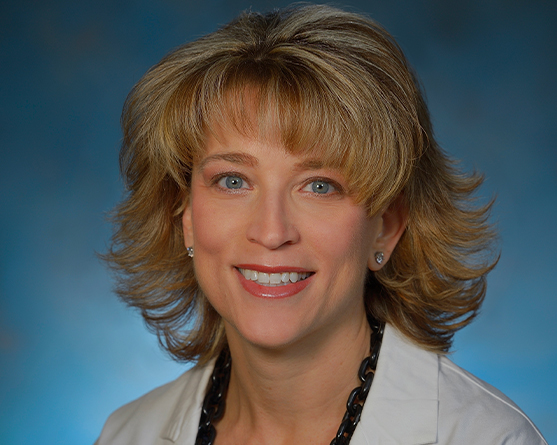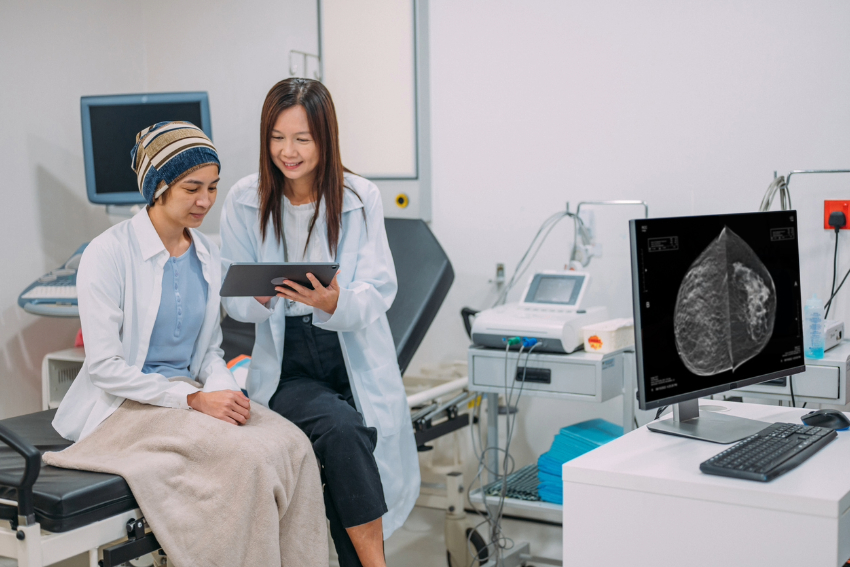Robin Ciocca, DO

October: Breast Cancer Awareness Month
Breast cancer is the most common cancer in women and the most frequent cancer diagnosed and treated at Main Line Health. Fortunately, advances in prevention, early detection and treatment mean more women diagnosed with breast cancer are living longer and with better quality of life than ever before. While there are many types of breast cancer, there is only one you, and our program is here to help you through every stage, from prevention through diagnosis and survivorship.
You can stay on top of your breast health by knowing more about your breast cancer risk, screening options and the benefits of genetic counseling.

Breast cancer risk factors can elevate your chance of developing breast cancer. These include:
Having risk factors does not mean you will develop breast cancer. You and your clinician can use this knowledge to develop a plan to lower your risk and a create a screening schedule that can detect breast cancer at its earliest, most treatable stage.

At least 10% of cancer cases are thought to be passed down from one generation of a family to the next. You may be more likely to have a cancer-related gene if you have a strong family history of breast, ovarian, pancreatic or prostate cancer, or have Ashkenazi Jewish ancestry.
Learning whether you have inherited a cancer-related gene can help your clinician create an early detection or prevention plan. Main Line Health's Genetics and Risk Assessment Program is available to anyone concerned about cancer risk due to a personal or family history.

If you are at average risk, you should begin routine mammograms at age 40. A mammogram remains the best way to detect breast cancer in the early stages. You do not need a prescription to schedule your screening mammogram.
All of our mammography centers have the latest 3D imaging technology, which is particularly effective for women between the ages of 40 and 50 who have dense breasts and/or those with a personal history of breast cancer. Advanced screening options such as breast MRI and ultrasound also are available.
Every breast cancer is different, just as every person is different. At Main Line Health, we build a treatment plan around your type of cancer and your life needs. Our nurse navigators will be with you every step of the way.
No one faces breast cancer alone. At each of our four accredited breast centers, you have the focused attention of an experienced breast care team that includes fellowship-trained breast surgeons, plastic and reconstructive surgeons, medical and radiation oncologists, genetic counselors, oncology certified nurses, oncology social workers, oncology nutritionists and oncology nurse navigators.
We understand the anxiety surrounding a cancer diagnosis. Wherever you are in your cancer journey, our team will help you and your loved ones find your way through the complexities of breast cancer diagnosis and treatment and access all services available at Main Line Health. Our philosophy is to treat you as a whole person — mind, body and spirit — not just a diagnosis.



The Main Line Health Breast Cancer Program offers advanced treatment for breast cancer along with coordinated, compassionate care every step of the way.

Jessica had genetic testing on a whim, and the results not only saved her life, but she's healthier than ever thanks to changes she's made.

Here's how the breast cancer care team at Main Line Health provides patients-focused care before, during and after breast cancer treatment.

Learn about the benefits of cancer support groups and the community that comes with them, including what kinds you can attend through Main Line Health.
